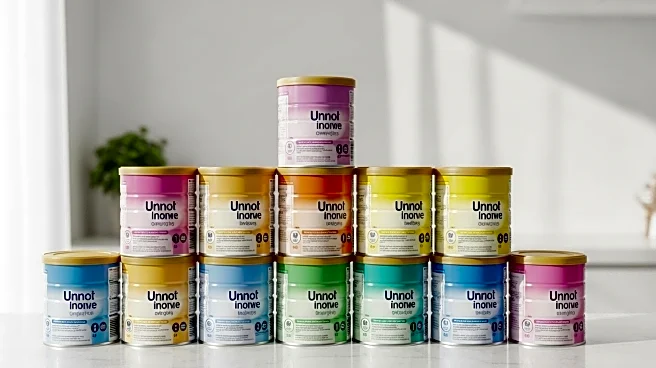What's Happening?
Consumer Reports has provided budget-friendly tips for parents looking to save money on infant formula, a significant expense for many families. The report highlights that store-brand formulas, often manufactured by the same companies as name brands, meet FDA nutrition standards and can be a cost-effective alternative. Additionally, purchasing formula from warehouse clubs like Costco and Sam's Club can offer better deals, with brands like Kirkland and Member's Mark scoring highly in recent tests. Powdered formula is also recommended as a cheaper option, provided it is approved by a pediatrician. The FDA has announced increased testing for contaminants in infant formula, following findings of concerning substances in some samples. This initiative aims to ensure the safety of formula products, which are consumed by 75% of babies in the U.S. by six months of age.
Why It's Important?
The cost of infant formula is a major financial burden for American families, often amounting to thousands of dollars in the first year. Consumer Reports' tips offer practical solutions to reduce this expense without compromising on safety or nutrition. The FDA's increased oversight is crucial in maintaining the quality and safety of formula products, addressing parental concerns about contaminants. This development is significant for public health, ensuring that infants receive safe and nutritious formula. The advice to avoid diluting formula or making it at home underscores the importance of proper nutrition for infant growth and development, highlighting potential health risks associated with unsafe practices.
What's Next?
As the FDA strengthens its oversight of the formula industry, parents can expect more rigorous testing and assurance of product safety. This may lead to increased consumer confidence in store-brand and wholesale formulas, potentially shifting purchasing habits. The emphasis on safe cost-saving measures could influence market dynamics, encouraging manufacturers to maintain high standards while offering competitive pricing. Parents and caregivers are advised to consult with pediatricians before making changes to their formula choices, ensuring that any cost-saving measures do not compromise infant health.
Beyond the Headlines
The broader implications of this development include potential shifts in consumer behavior towards more affordable formula options, impacting the market share of name-brand products. The FDA's initiative may also prompt manufacturers to innovate and improve formula quality, addressing safety concerns and enhancing nutritional value. This could lead to long-term changes in industry standards and practices, benefiting both consumers and manufacturers. Additionally, the focus on safe formula practices highlights the importance of public health education, ensuring parents are informed about the risks of unsafe formula preparation.










